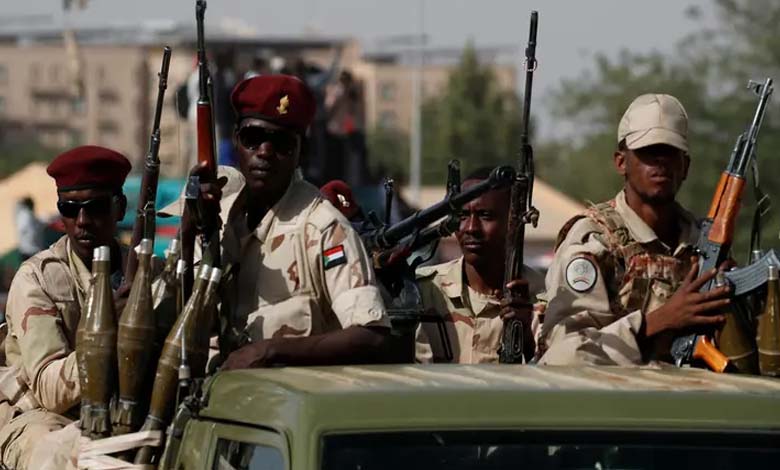Sudanese Army’s Threats to its Neighbors: An Internal Distraction Signaling Regional Dangers

Do the Sudanese army‘s threats against Chad and South Sudan hide “internal despair” or an “unprepared regional gamble”?
These questions emerged following statements made by Yasser Al-Atta, the second-in-command of the Sudanese Sovereign Council, who threatened to strike Chadian airports and “centers of influence” in Juba, in what seemed like a “war-like speech.”
-
Sudanese Army Violations Against Civilians: War Crimes Threatening the Country’s Future
-
The Sudanese Army’s Reliance on Mercenaries and Foreign Forces: The Collapse of Local Military Capabilities
-
“New Iranian Support”: Plane Loaded with Weapons Arrives for Sudanese Army
Yasser Al-Atta, a member of the Sudanese Sovereign Council and assistant to the army’s commander-in-chief, stated, “We will take revenge on Chadian President Mahamat Idriss Déby, and warn him that the airports of N’Djamena and Am Jarass are legitimate targets for the Sudanese armed forces.”
He also attacked what he referred to as “centers of influence” in South Sudan.
Al-Atta has often attacked neighboring countries, accusing them of supporting the Rapid Support Forces, and in November 2023, he accused Chad of using Am Jarass airport to supply the RSF.
He also accused Uganda, the Central African Republic, and Kenya of supporting the RSF.
-
Testimonies Reveal New Violations by the Sudanese Army in the Country
-
How the Muslim Brotherhood Reshaped the Sudanese Army
Official Reactions
The Chadian Ministry of Foreign Affairs, in a statement, considered Al-Atta‘s remarks to be a “declaration of war,” with all the consequences that follow.
It stated that it had taken “very seriously” Al-Atta‘s statements, which included…
As for South Sudan, its Ministry of Foreign Affairs formally protested Al-Atta‘s statements, saying it would “take measures to protect its citizens and thwart any aggression.”
The ministry summoned Sudanese Ambassador to Juba Essam Karrar and handed him an official protest regarding these statements.
-
Dindar: Tribal Conflict Turns into an Unforgivable Crime by the Sudanese Army
-
Massacre in “Dindar”: The Sudanese Army and the Tragedy of Ethnic Cleansing Targeting Civilians
Creating a Fictional Enemy or a Calculated Escalation?
Al-Atta‘s remarks reveal alarming truths, including:
- The siege mentality of the Sudanese military, where the scenario of the “external enemy” is reproduced as a cover for failure to resolve the battles against the Rapid Support Forces.
- The crisis of the regime in Port Sudan, pushing them to antagonize former allies in a desperate attempt to transform the civil war into a regional conflict.
- A losing bet that international responses will favor Khartoum, while facts show the region can no longer tolerate proxy wars.
In this regard, Atim Simon, a political analyst from South Sudan, said that “Al-Atta is trying to replicate the experience of the former regime led by President Omar El-Bashir, which was based on creating internal cohesion through hostility toward neighboring countries.”
-
From Infrastructure Destruction to Arms Smuggling: Analyzing the Sudanese Army’s Manipulation of Facts
-
Sudanese Army’s Statement on Shambat Bridge Destruction: A Desperate Attempt to Polish a Tarnished Image
Simon added, “Yasser Al-Atta wants to create an illusion of victory and euphoria by embarking on other battles after their takeover of the presidential palace in Khartoum.”
While emphasizing that Juba “has significant interests with Sudan,” Simon warned that “this wave of hostility could seriously damage the relations” between the two countries, and such remarks could lead some currents in South Sudan to question the usefulness of continuing relations with Sudan, leading to direct confrontations and the cessation of oil supplies, thus creating a new economic reality away from Khartoum.
“An Irresponsible Threat and the Spark for Regional War”
For his part, Sudanese writer and political analyst Mohamed Al-Mokhtar believes that Al-Atta‘s threats reflect the confusion of the regime in Port Sudan, which is trying to extend the internal conflict into a regional confrontation.
-
Demands for the Dissolution of the Sudanese Army and Pursuit of the Muslim Brotherhood
-
The Flow of Weapons to the Sudanese Army from Foreign Sources… What Is Happening?
Al-Mokhtar said, “These are irresponsible threats that threaten security and peace in the region and will have long-lasting consequences. They reflect the confusion of the Port Sudan group that follows the orders of the Islamic movement, which started the war to achieve a specific agenda and fabricated a completely misleading narrative after it escalated into a full-blown war.”
He added, “Some countries supporting the Sudanese authorities may reconsider their positions after these threats, especially if fears of the region turning into an open battleground increase.”
What Lies Ahead for Sudan?
Strategic writer and analyst Taj Al-Sir Othman said that Yasser Al-Atta‘s remarks “threaten to ignite the region,” pointing out that “the war has devastated the country and threatens to divide it.”
-
Experts identify reasons for the collapse of the Sudanese Army
-
The Sudanese army targets schools and kills innocents in North Darfur
In an article published in Sudanese newspaper “Al-Tagheer,” Othman considered these “threats to strike military targets in Chad will spark flames of war in the region.”
He wrote, “The severity of these conditions, which prolong the war and its destruction, requires escalating popular struggle inside and outside to end the war, reclaim the revolution, achieve a democratic civil government, dismantle all militias, establish a unified professional national army under civilian control, improve living, economic, health, and security conditions, allow displaced persons to return to their homes, villages, and cities, and rebuild what was destroyed by the war.”












